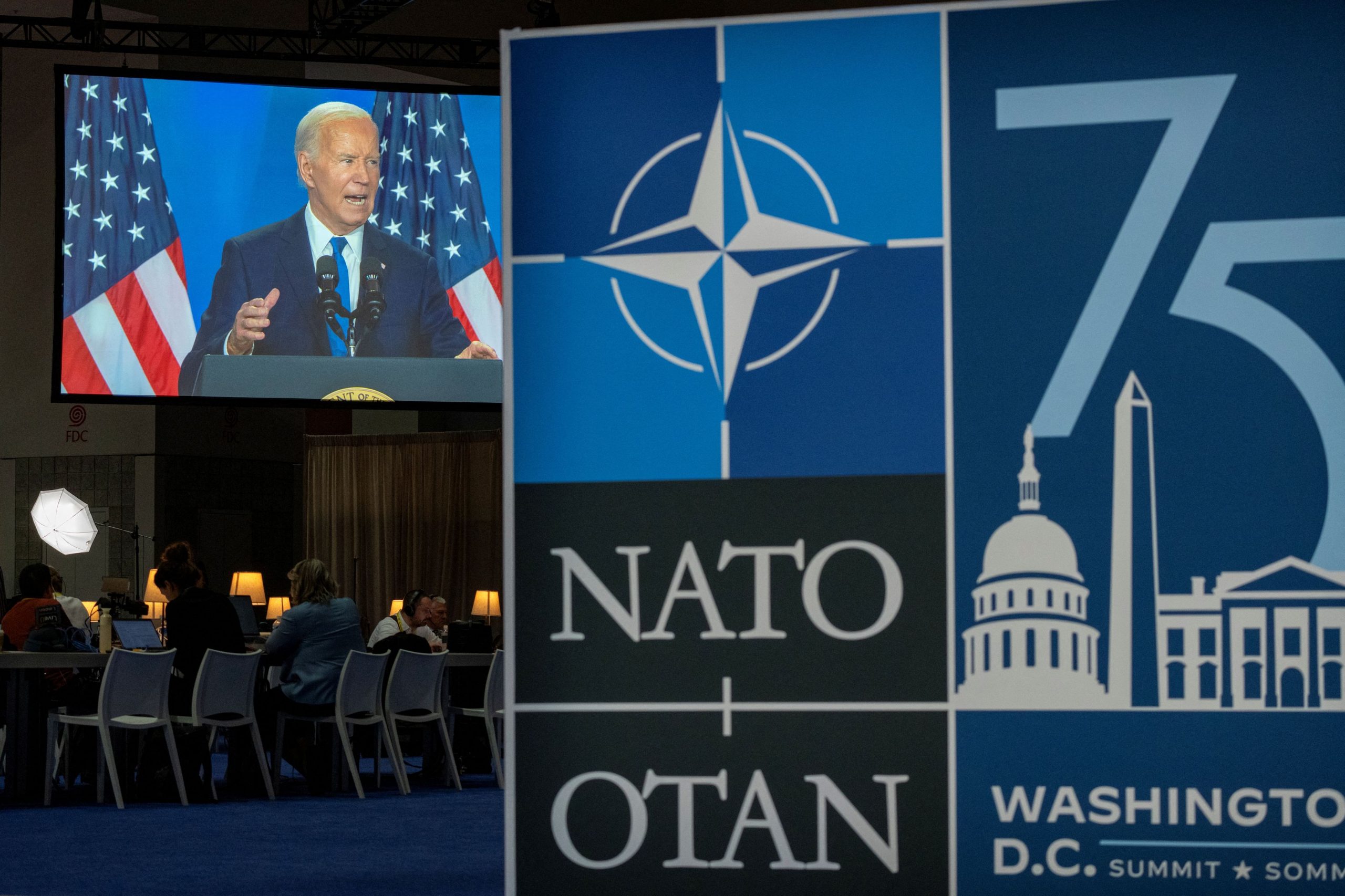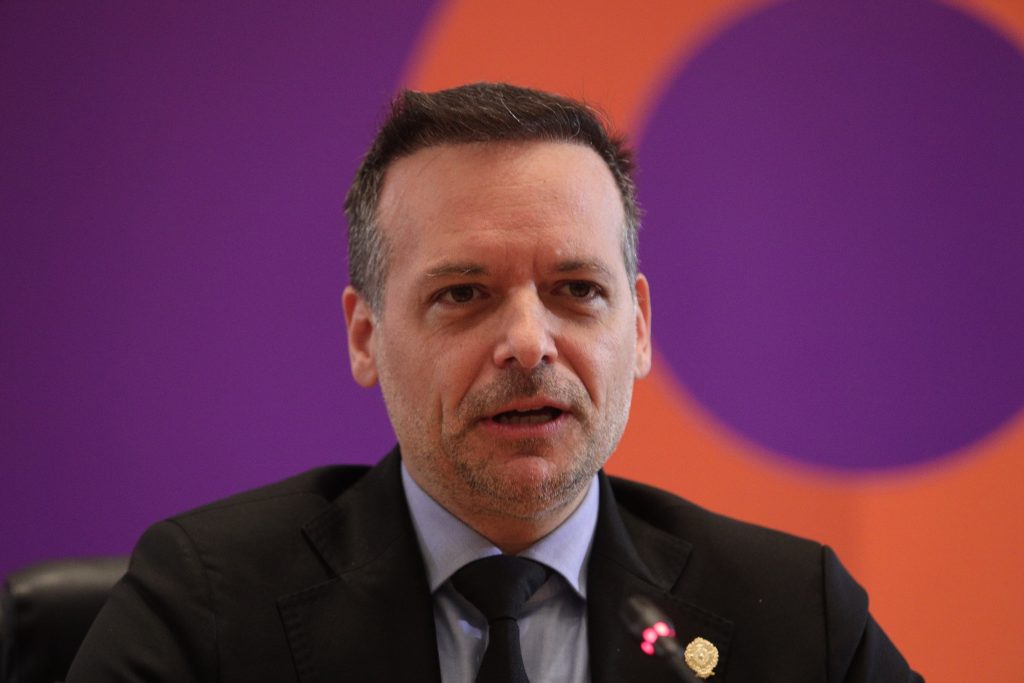Twenty twenty-four is not just an election year; it is the election year. Taiwan, India, Russia, Mexico, the UK, France, Europe – have already gone to the polls. But the election that remains, the one that the whole world is holding its breath over, is the U.S. Presidential election in November.
From now until the polls, To Vima will be traveling around the United States to try to help our readers understand the world’s indispensable nation – which has become unrecognizable not only to admirers around the world, but to many Americans themselves.
Our first stop is Washington, D.C. – where the NATO Summit was held this past week. To Vima hosted a roundtable discussion with Steven Cook – of the Council on Foreign Relations, and Endy Zemenides – the Executive Director of the Hellenic American Leadership Council and Board Member of the Chicago Council on Global Affairs – to analyze what the NATO Summit has taught us about America’s place in the world.
When NATO’s Washington Summit was planned, leaders and certainly American officials were anticipating a grand celebration marking the alliance’s 75th Anniversary. Instead, there was a dark cloud hanging over their heads.
“Trepidation, uncertainty, anxiety, not a happy summit.” These were some of the words that our guests used to describe this Anniversary Summit that was not the celebration that it was intended to be.
Moreover, they maintained that there is no way that the dark cloud will dissipate in the short term. The event that galvanized NATO – Russia’s war of aggression against Ukraine – is projected to last another 3 to 4 years. Steven Cook asked whether Congressional Republicans would continue to fund Ukraine’s defense or whether a President Trump would remain committed to Ukraine’s freedom and sovereignty. Endy Zemenides wondered whether President Biden – or another Democrat – could continue to rally Europeans and Americans who have become Ukraine weary to continue to sacrifice for this war. Both conceded that none of these questions can be answered before November.
Existential questions for NATO
Secretary General Jens Stoltenberg celebrated a major landmark of the alliance becoming the longest standing security alliance, passing ancient Greece’s Delian League. Zemenides reacted to the word “ancient,” asking whether NATO could plan for the future when the de-facto leader of the alliance (whether Biden or Trump) is older than the oldest alliance in history. Cook noted that America has a “red foreign policy and a blue foreign policy, but not much of an American foreign policy,” because broad debates about foreign policy are no longer common. Both argued that a positive of a search for a new Democratic nominee would be such a debate – what exactly is the worldview of a Kamala Harris, a Gretchen Whitmer or a Wes Moore?
The problem of Turkey
Zemenides emphatically stated that the discussion over the future of NATO must answer a fundamental question: “Will NATO remain an alliance of values, or merely a marketplace within which members can conduct a transactional foreign policy?” He argued that while the Biden Administration is appropriately credited for rallying the alliance against Russia, it also harmed the alliance by overtly and publicly accepting Turkey’s transactional approach to the alliance. For Cook, Turkey – especially in light of its democratic backsliding – represented the great tension within NATO: is it purely a defense alliance (which would mean transactionalism is allowed) or is it (as was anticipated during its founding) an alliance of democracies?
If not NATO, then what?
Picking up on Prime Minister Mitsotakis’ discussion at the Council on Foreign Relations, Zemenides discussed the development of European defense institutions and capabilities which for now are complementary to NATO. After noting that the U.S. has traditionally opposed a separate European defense identity, both Cook and Zemenides agreed that the U.S. – both Republicans and Democrats – may be inadvertently risking pushing Europe to develop a defense identity wholly separate from NATO instead of assuming a greater burden within NATO. Cook, however, sees a major obstacle: “Will the Poles, or Baltic nations trust that France will protect them? Is Europe equipped to counter Russia’s total/hybrid warfare in the Balkans?”
Biden’s Challenges
As this discussion went on, the dark cloud hanging over the NATO Summit became darker. Both analysts received a news alert that Nancy Pelosi was urging President Biden to reconsider his candidacy. They noted that Biden’s challenges were overshadowing the question that Trump has demonstrated evidence of his own impairment and that neither candidate enjoys the confidence of the majority of Americans (or of the world for that matter). And in the event of a second Trump Administration, they agreed that there will be none of the so called “adults in the room” who may restrain Trump serving as Cabinet Secretaries or Senior Advisors. Loyalty to Trump will be the number 1 qualification.
Pessimism dominated this discussion, but at the end there was a hopeful ray of light. Zemenides argued that America’s global leadership suffered more from “not showing up” rather than by being defeated. He used the Port of Piraeus as an example. “You can’t just lecture Greece – or anyone else – to reject Chinese investment. Show up with your own investor. We didn’t lose to the Chinese in Piraeus; we didn’t even play.” Cook noted that much of the world would be thrilled if the U.S. merely showed up. As he said, “people in the Middle East constantly tell me, ‘if the US would only lead. . .’”
When NATO turns 76, it will have a new Secretary General and very likely a new U.S. President. Will there be a new American approach to NATO as well? As our guests reminded us again and again, we will have to wait until November.



